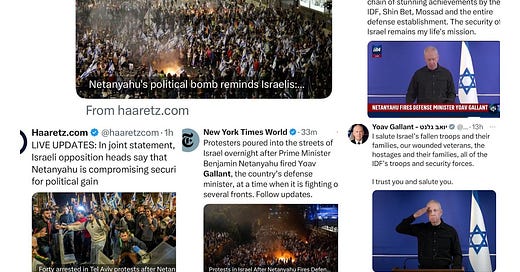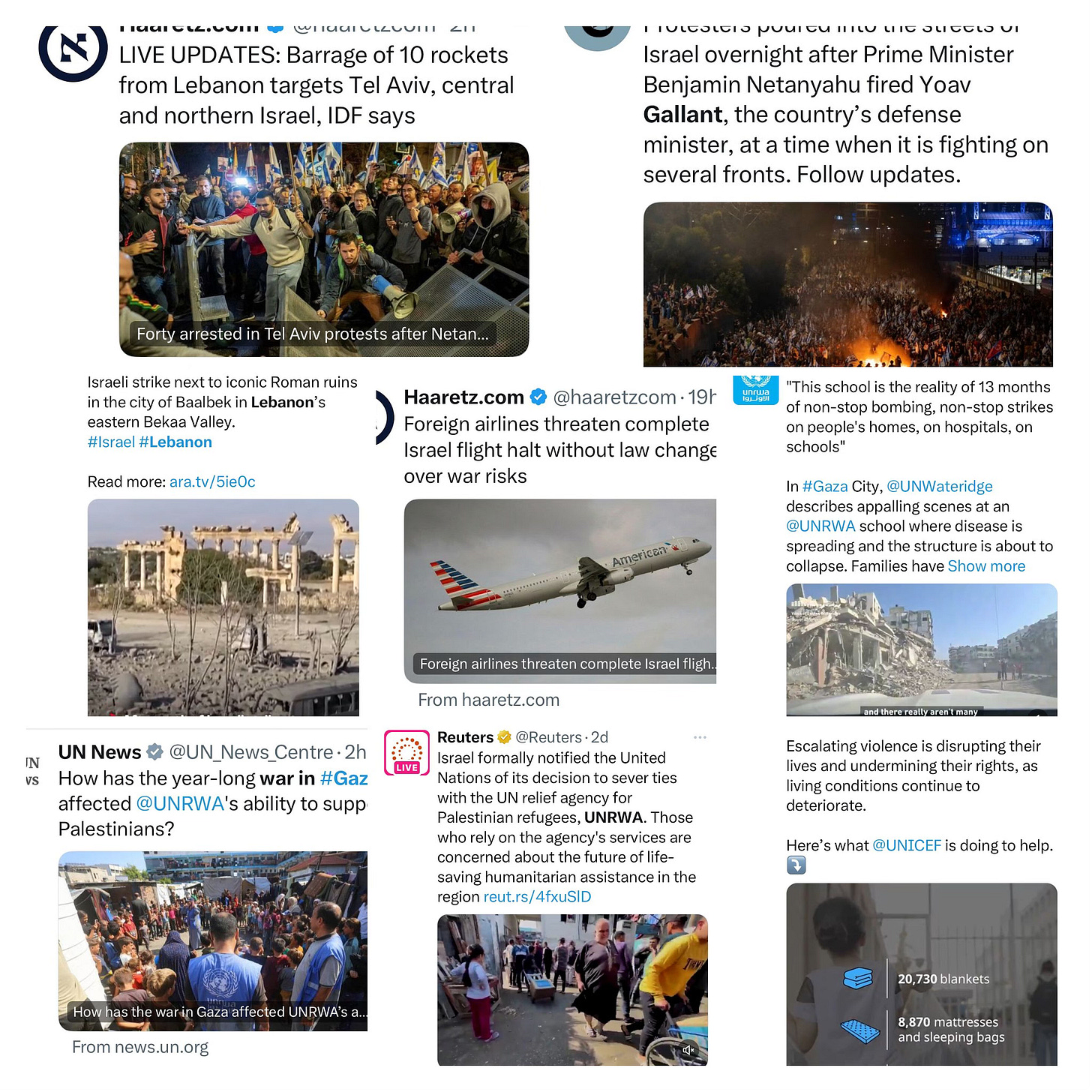Israel at War - Day 399
1. PM Netanyahu Fires Defense Minister Gallant
After months of rumors, leaks, public disputes over the war policy, open dissatisfaction, and resentment, PM Netanyahu fired Defense Minister Yoav Gallant and nominated Israel Katz, who was the foreign minister to take Gallants’ place. PM Netanyahu announced his move two minutes before the eight o’clock prime time TV evening news. Analysts add that he also chose the time when the rest of the world was tuned to the US Presidential elections. It is important to mention here that Gallant was the only Israeli official who had good relations with the Biden administration, he kept an open line with his colleagues in Washington DC, the Americans trusted him, and his professionalism.
Thousands of Israelis rushed to the streets all over the country to protest against the political decision, saying that PM Netanyahu fired the man only for his own personal political survival, to stabilize his coalition. If Gallant continued to insist on the conscription the Haredi ultra-orthodox, it could have led to the collapse of the coalition. Many blocked main roads and the main highway in Tel Aviv, setting fires, shouting, and marching. Forty of the demonstrators were detained and later released.
PM Netanyahu explained that the mistrust between him and Gallant was irreparable and that he had no choice for the sake of the government strategy for the war.
Gallant, on the other hand, said that he was fired simply because of three reasons: 1. He did not want to support the bill that would release all Haredi youth from the draft to the army 2. Because he pushed for a deal to release the 101 Israeli hostages still held by Hamas in Gaza. 3. Because he called to establish an investigative committee for the events that led to the October 7th crisis. He ended his public speech with a salute to the army and the people of Israel.
2. Initial Responses in Israel to Trump's Election Victory
Israeli political leaders, analysts, and the public followed the U.S. election race closely, with live updates throughout the night, and were quick to respond.
As President Trump’s victory was announced, PM Netanyahu congratulated him on X, for "history's greatest comeback", and added that Trump’s victory was "a powerful recommitment to the great alliance between Israel and America." Netanyahu later spoke with President-elect Trump on the phone, following his victory address, where Trump stated: "They said I'm going to start wars – I'm going to end wars."
President Isaac Herzog also congratulated Trump for his “historic return to the White House,” adding that he was looking forward to working with President-elect Trump to build a future of peace and security, and that he was “a true and dear friend of Israel, and a champion of peace and cooperation in our region.” The Hostages Families Forum also congratulated Trump and emphasized the importance of ensuring that rescuing the hostages “remains a top priority."
Right-wing and far-right political leaders and pundits expressed their joy at Trump’s election for a second term at the White House, emphasizing his loyalty to Israel’s best interests in the region.
While public opinion polls in Israel showed that two-thirds of Israelis believed Trump would be better for Israel, some local and international analysts believe that the joy over his re-election may be proven partially wrong.
Senior Palestinian leaders also responded to Trump’s victory. Senior Hamas official Sami Abu Zuhri said in a media interview that Trump will be held accountable for his statements and that he can stop the Gaza war within hours, adding "We urge Trump to learn from Biden's mistakes." Palestinian President Mahmoud Abbas, in an official statement, congratulated Trump, and said "We are confident that, under your leadership, the United States will support the legitimate aspirations of the Palestinian people."
3. Two Major Security Investigations at PM Netanyahu’s Office
The Israeli secret service, the Shin Bet, is conducting two investigations at PM Netanyahu's bureau under suspicion of legal violations. Most of the details are still under a gag order for security reasons. One case deals with a spokesperson close to PM Netanyahu, who did not receive clearance to participate in classified and top-secret discussions, but was present in those forums nonetheless. He and others are suspected of stealing military documents and leaking them to the widely distributed German newspaper, Bild, to influence, help, and strengthen PM Netanyahu’s stand on the hostage negotiations. According to some analysts PM Netanyahu is not that eager to release the hostages, and he prefers what he has called a total victory and the elimination of Hamas.
The other investigation deals with the suspicion that PM Netanyahu’s aids and advisors were rewriting the protocols of the cabinet meetings and other decision forums regarding the October 7th events, so that PM Netanyahu would look better if and when there is an investigative committee that will examine the decision-making process that led to the collapse of the army and the state agencies.
Those two investigations were held under the radar for some time, but now some of the details have been revealed by the press and the investigation became partly open. PM Netanyahu often accuses the army of jeopardizing his strategy and for intentionally leaking information against him. There is deep mistrust between his office, the chief of staff, and other senior army generals.
4. Haredi Draft Exemption and Day Care Subsidies Saga Continues
PM Netanyahu strives to resolve the issue of Haredi exemption from military service while keeping his coalition intact. To this end, he nixed the Haredi daycare subsidies bill, designed to circumvent a High Court of Justice ruling to withhold state funding for early childhood care to Haredi men eligible for conscription, having failed to secure a Knesset majority.
Netanyahu’s efforts included firing defense minister Gallant, as well as placing sanctions on two members of his coalition for voicing their objection to the bill, at a time when Israel is fighting an ongoing war on multiple fronts and the army is in dire need of additional recruits.
A senior member of the Haredi Yahadut Hatorah party told an Israeli media outlet that he believes while chances of passing the exemption law in the current political climate are not high, Netanyahu will bring the day care subsidies bill up for approval in a few weeks, having secured the necessary Knesset majority, after dismantling potential resistance from some of his coalition partners, in return for political power
5. Israel Still Deeply Engaged in War on Three Fronts
Israeli forces continue to operate intensively in southern Lebanon continuing with a ground operation aimed to clean the area from all Hizbollah activities, stockpiles of ammunition, and attack tunnels. The Israeli air force continues to bomb targets in the capital of Lebanon, Beirut, mainly targeting locations used by Hizbollah. The toll in human lives, other casualties and infrastructure is high and costly. Meanwhile there is an intensive effort by the Biden administration to reach an agreement between the sides to end the war, and distance all Hizbollah forces and militants behind the Litani river line, which is located several kilometre from the northern border of Israel. A special American envoy is leading those efforts and shuttles between Jerusalem and Beirut.
In the south the Israeli army is still occupying wide areas in the Gaza Strip. In the last few weeks the army has operating extensively in northern Gaza, ordering the civilians to move to the south, and trying to clean the area from all Hamas militants and armed members. The international community and the Biden administration are demanding that Israel increase the supply of humanitarian aid to the civilians in the area. Israel tends not to comply. PM Netanyahu is eager to achieve his main target of the war: eliminate Hamas. Meanwhile there is evidence of hunger and a real dire humanitarian situation in the area.
Israel also operates intensively in the West Bank, where there are many efforts by the army to prevent and locate hostile players and future terrorists.
All three intensive war fronts combined are taking a heavy toll on the Israeli economy and, of course, on individuals who have been drafted for months and are eager to return to their regular lives and families. The toll in human lives is very heavy on all sides involved in the conflict.








